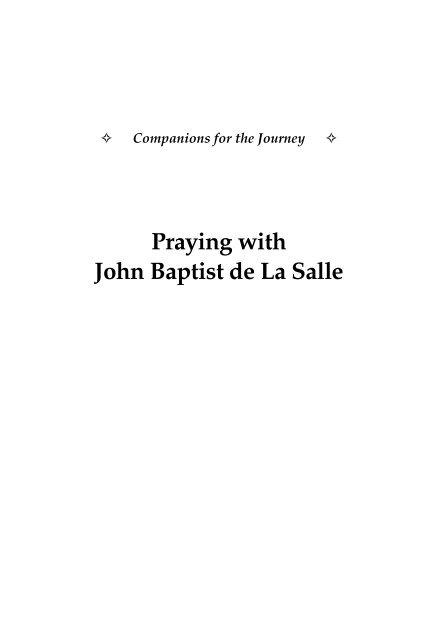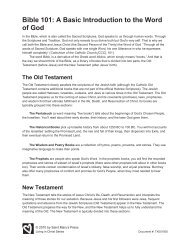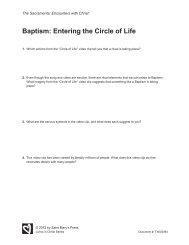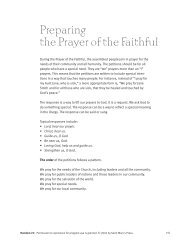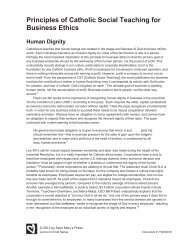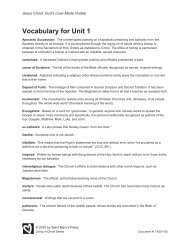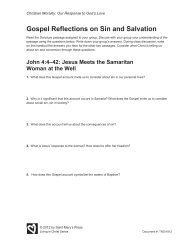Praying with John Baptist de La Salle - Saint Mary's Press
Praying with John Baptist de La Salle - Saint Mary's Press
Praying with John Baptist de La Salle - Saint Mary's Press
Create successful ePaper yourself
Turn your PDF publications into a flip-book with our unique Google optimized e-Paper software.
✧ 9 ✧place <strong>with</strong>in yourself, perhaps while riding to and from work,while sitting in line at the <strong>de</strong>ntist’s office, or while waiting forsomeone. Do the best you can, knowing that a loving God ispresent everywhere. Whether the meditations in this bookare used for solitary prayer or <strong>with</strong> a group, try to create aprayerful mood <strong>with</strong> candles, meditative music, an open Bible,or a crucifix.Open yourself to the power of prayer. Every human experiencehas a religious dimension. All of life is suffused <strong>with</strong>God’s presence. So remind yourself that God is present as youbegin your period of prayer. Do not worry about distractions.If something keeps intruding during your prayer, spend sometime talking <strong>with</strong> God about it. Be flexible because God’s Spiritblows where it will.Prayer can open your mind and wi<strong>de</strong>n your vision. Beopen to new ways of seeing God, people, and yourself. Asyou open yourself to the Spirit of God, different emotions areevoked, such as sadness from ten<strong>de</strong>r memories, or joy from acelebration recalled. Our emotions are messages from Godthat can tell us much about our spiritual quest. Also, prayerstrengthens our will to act. Through prayer, God can touchour will and empower us to live according to what we knowis true.Finally, many of the meditations in this book will call youto employ your memories, your imagination, and the circumstancesof your life as subjects for prayer. The great mysticsand saints realized that they had to use all their resources toknow God better. In<strong>de</strong>ed, God speaks to us continually andtouches us constantly. We must learn to listen and feel <strong>with</strong> allthe means that God gave us.Come to prayer <strong>with</strong> an open mind, heart, and will.Preview each meditation before beginning. Spend afew moments previewing the readings and especially the reflectionactivities. Several reflection activities are given ineach meditation because different styles of prayer appeal to9
✧ 10 ✧different personalities or personal needs. Note that each meditationhas more reflection activities than can be done duringone prayer period. Therefore, select only one or tworeflection activities each time you use a meditation. Do notfeel compelled to complete all of the reflection activities.Read meditatively. After you have placed yourself inGod’s presence, the meditations offer you a story about De <strong>La</strong><strong>Salle</strong> and a reading from his writings. Take your time reading.If a particular phrase touches you, stay <strong>with</strong> it. Relish itsfeelings, meanings, and concerns.Use the reflections. Following the readings is a short reflectionin commentary form meant to give perspective to thereadings. Then you will be offered several ways of meditatingon the readings and the theme of the prayer. You may be familiar<strong>with</strong> the different methods of meditating, but in caseyou are not, they are <strong>de</strong>scribed briefly here:✦ Repeated short prayer or mantra: One means of focusing yourprayer is to use a mantra, or prayer word. The mantra maybe a single word or a short phrase taken from the readingsor from the Scriptures. For example, a mantra for a meditationon faith might be “I go before you” or “trust.” Repeatedslowly in harmony <strong>with</strong> your breathing, the mantrahelps you center your heart and mind on one action or attributeof God.✦ Lectio divina: This type of meditation is “divine studying,”a concentrated reflection on the word of God or the wisdomof a spiritual writer. Most often in lectio divina, youwill be invited to read one of the passages several timesand then concentrate on one or two sentences, pon<strong>de</strong>ringtheir meaning for you and their effect on you. Lectio divinacommonly ends <strong>with</strong> formulation of a resolution.10
✧ 11 ✧✦ Gui<strong>de</strong>d meditation: In this type of meditation, our imaginationhelps us consi<strong>de</strong>r alternative actions and likely consequences.Our imagination helps us experience new ways ofseeing God, our neighbors, ourselves, and nature. WhenJesus told his followers parables and stories, he engagedtheir imagination. In this book, you will be invited to followgui<strong>de</strong>d meditations.One way of doing a gui<strong>de</strong>d meditation is to read thescene or story several times until you know the outline andcan recall it when you enter into reflection. Or before yourprayer time, you may wish to record the meditation on atape recor<strong>de</strong>r. If so, remember to allow pauses for reflectionbetween phrases and to speak <strong>with</strong> a slow, peaceful paceand tone. Then during prayer, when you have finished thereadings and the reflection commentary, you can turn onyour recording of the meditation and be led through it. Ifyou find your own voice too distracting, ask a friend tomake the tape for you.✦ Examen of consciousness: The reflections often will ask youto examine how God has been speaking to you in your pastand present experience—in other words, the reflectionswill ask you to examine your awareness of God’s presencein your life.✦ Journal writing: Writing is a process of discovery. If youwrite for any length of time, stating honestly what is onyour mind and in your heart, you will unearth much aboutwho you are, how you stand <strong>with</strong> your God, what <strong>de</strong>eplongings resi<strong>de</strong> in your soul, and more. In some reflections,you will be asked to write a dialog <strong>with</strong> Jesus or someoneelse. If you have never used writing as a means of meditation,try it. Reserve a special notebook for your journalwriting. If <strong>de</strong>sired, you can go back to your entries at a futuretime for an examen of consciousness.✦ Action: Occasionally, a reflection will suggest singing a favoritehymn, going out for a walk, or un<strong>de</strong>rtaking someother physical activity. Actions can be meaningful forms ofprayer.11
✧ 12 ✧Using the Meditations for Group PrayerIf you wish to use the meditations for community prayer,these suggestions may help:✦ Read the theme to the group. Call the community into thepresence of God, using the short opening prayer. Invite oneor two participants to read one or both of the readings. Ifyou use both readings, observe the pause between them.✦ The reflection commentary may be used as a reading, or itcan be <strong>de</strong>leted, <strong>de</strong>pending on the needs and interests of thegroup.✦ Select one of the reflection activities for your group. Allowsufficient time for your group to reflect, to do a centeringprayer or mantra, to accomplish a studying prayer (lectiodivina), or to finish an examen of consciousness. Dependingon the group and the amount of available time, youmay want to invite the participants to share their reflections,responses, or petitions <strong>with</strong> the group.✦ Reading the passage from the Scriptures may serve as asummary of the meditation.✦ If a formulated prayer or a psalm is given as a closing, itmay be recited by the entire group. Or you may ask participantsto offer their own prayers for the closing.Now you are ready to begin praying <strong>with</strong> <strong>John</strong> <strong>Baptist</strong> <strong>de</strong><strong>La</strong> <strong>Salle</strong>, a faithful and caring companion on this stage of yourspiritual journey. De <strong>La</strong> <strong>Salle</strong> has inspired many people toseek a closer relationship <strong>with</strong> God. It is hoped that you willfind him to be a true soul-companion.12
✧ 13 ✧✧ Introduction ✧De <strong>La</strong> <strong>Salle</strong>: Led by the Spirit<strong>John</strong> <strong>Baptist</strong> <strong>de</strong> <strong>La</strong> <strong>Salle</strong> never inspired the popular <strong>de</strong>votionthat people show toward Francis of Assisi, Thérèse <strong>de</strong> Lisieux,or Anthony of Padua. His name may be recognized only bypeople who atten<strong>de</strong>d a school staffed by the Brothers of theChristian Schools.True, De <strong>La</strong> <strong>Salle</strong> foun<strong>de</strong>d a major religious congregation.He was proclaimed the patron of teachers by Pope Pius XII.He systematized and ma<strong>de</strong> practical many of the educationalmethods consi<strong>de</strong>red standard practice today, such as teachingan entire group of pupils simultaneously and giving regular,individual reports about stu<strong>de</strong>nts’ progress. He started ateacher training center, uncommon in his time. But few Christiansknow anything about him.Why should twentieth-century Christians be interested inor inspired by De <strong>La</strong> <strong>Salle</strong>’s spirituality? Like most of us, De<strong>La</strong> <strong>Salle</strong> experienced no blinding visions or voices out of thethun<strong>de</strong>r telling him what God wanted him to do. Instead, likeus, he listened to people, saw needs, felt compassion, andprayed for God’s spirit.French society disdained teaching in charity schools as awork fit only for those who could do nothing better. Despitestrenuous objections from his relatives and friends, De <strong>La</strong><strong>Salle</strong>, who was a member of a distinguished family, not onlyformed a community of teachers to serve poor people butgave away his wealth and position to live like them.In short, De <strong>La</strong> <strong>Salle</strong> held firmly to his beliefs. Holdingfast to his course in life often <strong>de</strong>man<strong>de</strong>d heroic faith andcourage. At the same time, De <strong>La</strong> <strong>Salle</strong> showed that following13
✧ 14 ✧the way of the Gospels in ordinary tasks, no matter how humble,can lead to holiness and the touch of God’s love. For De<strong>La</strong> <strong>Salle</strong>, spirituality and day-to-day <strong>de</strong>cisions about practicalmatters could not be separated. When he told his Brothershow to teach writing to the children, he was telling them howto love the children. When done in the spirit of faith—that is,seeing each child as sacred to God—every act of service becomesa prayer. Thus, De <strong>La</strong> <strong>Salle</strong>’s spirituality is for theworkplace and the home, the classroom and the streets.De <strong>La</strong> <strong>Salle</strong>’s Early Years<strong>John</strong> <strong>Baptist</strong> <strong>de</strong> <strong>La</strong> <strong>Salle</strong> was born in 1651, early in the reign ofthe Sun King, Louis XIV, and in the middle of Le Grand Siecle,the century many consi<strong>de</strong>r a high point of French culture. Hewas the el<strong>de</strong>st of eleven children, of whom seven survived.Born into a wealthy family of Reims, De <strong>La</strong> <strong>Salle</strong> mighthave eventually moved among the rich and famous of France.Like most children of well-to-do parents, he received tutoringat home until he reached nine years of age. From then until hewas eighteen, he studied at the Collège <strong>de</strong>s Bon-Enfants. Theschool’s classical curriculum inclu<strong>de</strong>d grammar and syntax,<strong>La</strong>tin, Greek, and philosophy.At age eleven, De <strong>La</strong> <strong>Salle</strong> took the first steps towardpriesthood by receiving the tonsure, which meant that a patchof hair at the top of his head was shaved. At fifteen, he inheriteda canonry at the cathedral of Reims. Becoming a cathedralcanon was an honor and provi<strong>de</strong>d additional income toDe <strong>La</strong> <strong>Salle</strong>’s family. The canons prayed the Divine Office togetherdaily in the cathedral, participated in the major liturgicalfeasts, and advised the archbishop. In 1670, De <strong>La</strong> <strong>Salle</strong>entered the major seminary of <strong>Saint</strong> Sulpice in Paris. Here helearned a method of meditative prayer that he would lateradapt for his Brothers. As part of the seminary routine onSundays, he taught religion to children in the parish, whichserved the most crime-rid<strong>de</strong>n section of Paris.The course of De <strong>La</strong> <strong>Salle</strong>’s life changed in 1671 whenboth of his parents died. Sud<strong>de</strong>nly De <strong>La</strong> <strong>Salle</strong> had charge ofthe family estate and his younger brothers and sisters.14
✧ 15 ✧Beginning His MissionRealizing that he nee<strong>de</strong>d a spiritual gui<strong>de</strong>, De <strong>La</strong> <strong>Salle</strong> choseNicolas Roland, a fellow canon at Reims. Unknown to bothmen, this relationship would lead De <strong>La</strong> <strong>Salle</strong> to assume hislife’s mission.Roland encouraged De <strong>La</strong> <strong>Salle</strong> to finish his studies forthe priesthood. At the age of twenty-seven, De <strong>La</strong> <strong>Salle</strong> wasordained. Two weeks later, Roland died, having named De <strong>La</strong><strong>Salle</strong> as the executor of his will and protector of the Sisters ofthe Holy Child Jesus, who were formed to educate poor girls.De <strong>La</strong> <strong>Salle</strong> helped the Sisters obtain letters patent, or legal status,and continued to say Mass for them and see to their spiritualneeds.One day, as De <strong>La</strong> <strong>Salle</strong> was coming to visit the Sisters, hemet Adrien Nyel. Nyel was a layman who had come to Reimsto establish a charity school for boys at the behest of MmeJeanne Dubois Maillefer, who was connected by marriage tothe De <strong>La</strong> <strong>Salle</strong> family. During the chance meeting, Nyel explainedhis intentions to De <strong>La</strong> <strong>Salle</strong>. Offering to help Nyelmake the necessary contacts, De <strong>La</strong> <strong>Salle</strong> suggested that Nyelstay at his house.One pastor agreed to establish a charity school for boysin his parish; thus, in April 1679, the first school opened itsdoors. Soon another donor wished to open a school on theother si<strong>de</strong> of Reims; Nyel obliged. The quarters provi<strong>de</strong>d bythe parish for Nyel and the other teachers became ina<strong>de</strong>quate.Out of his own pocket, De <strong>La</strong> <strong>Salle</strong> rented a house near hisown for the teachers. Shortly, Nyel opened a third school inReims.Despite the success of the schools, problems arose. Thesupervision of the schools <strong>de</strong>man<strong>de</strong>d more attention thanNyel could give. The teachers were young, untrained, and inneed of clear direction. The classrooms bulged <strong>with</strong> boys.Sizing up the situation, De <strong>La</strong> <strong>Salle</strong> <strong>de</strong>ci<strong>de</strong>d to invite theteachers into his home for their meals. In this way, he couldwork <strong>with</strong> them and, he hoped, improve their skills and motivationas teachers.15
✧ 16 ✧His plan worked. The teachers improved and so did or<strong>de</strong>rin the schools. Even so, De <strong>La</strong> <strong>Salle</strong> was in a quandary. Onone hand, he wanted the charity schools to fulfill their mission,but their success would <strong>de</strong>pend on the steady growth ofcompetence among the teachers, a growth largely <strong>de</strong>pen<strong>de</strong>nton his involvement <strong>with</strong> them. On the other hand, he was notcertain how involved he should become <strong>with</strong> the charityschools and the teachers.De <strong>La</strong> <strong>Salle</strong> sought the advice of Father Nicolas Barré,who had worked to set up schools for poor children in Rouenand Paris. Barré’s advice distressed De <strong>La</strong> <strong>Salle</strong>. In effect, hesuggested that De <strong>La</strong> <strong>Salle</strong> live <strong>with</strong> the schoolmasters.One contemporary of De <strong>La</strong> <strong>Salle</strong>’s <strong>de</strong>scribed those whotaught school as “gamblers, drunkards, libertines, ignorant,and brutal.” <strong>La</strong>ter in his life, De <strong>La</strong> <strong>Salle</strong> admitted, “Thosewhom I was at first obliged to employ as teachers, I rankedbelow my own valet, hence the very thought of having to live<strong>with</strong> them was unbearable” (W. J. Battersby, St. <strong>John</strong> <strong>Baptist</strong> <strong>de</strong><strong>La</strong> <strong>Salle</strong>, pp. 41, 71). Nevertheless, De <strong>La</strong> <strong>Salle</strong> <strong>de</strong>ci<strong>de</strong>d tomove the schoolmasters into his own home.Anger, disbelief, and accusations of madness greeted De<strong>La</strong> <strong>Salle</strong>’s actions. Relatives removed his younger brothersfrom his care. De <strong>La</strong> <strong>Salle</strong> persevered, believing that providingdisciplined, competent teachers was a task given to himby God.Un<strong>de</strong>r De <strong>La</strong> <strong>Salle</strong>’s tutelage, the teachers increased incompetence. Requests came to open other charity schools forboys. Nevertheless, the masters began to grumble about theinsecurity and the hard life of religious discipline. De <strong>La</strong> <strong>Salle</strong>urged them to rely on Provi<strong>de</strong>nce, but they remin<strong>de</strong>d himthat he did not have to worry if the schools failed because hewas in<strong>de</strong>pen<strong>de</strong>ntly wealthy.Once again, De <strong>La</strong> <strong>Salle</strong> prayed over the matter andturned to Father Barré for advice. Barré suggested that if De<strong>La</strong> <strong>Salle</strong> wanted the charity schools to prosper, he should renouncehis canonry and distribute his money to poor people.If God wanted the charity schools established, God would see16
✧ 17 ✧to it. This radical recommendation was countered by manyother voices, but after a long period of prayer, De <strong>La</strong> <strong>Salle</strong> resignedhis canonry and gave away his wealth to the victims ofa famine raging through France. He became as poor and relianton God’s provi<strong>de</strong>nce as the schoolmasters.Forming the CommunityDe <strong>La</strong> <strong>Salle</strong> implemented the most useful methods of instructionin the schools and negotiated to open new charity schools.He also began forming the teachers into a religious community.They followed a schedule that inclu<strong>de</strong>d specific times forprayer, meals, and work. Not all of the men were willing tocommit themselves to such a lifestyle; some left, a small groupstayed.De <strong>La</strong> <strong>Salle</strong> was now totally committed to the communityof teachers. To establish their unique i<strong>de</strong>ntity as laymen <strong>de</strong>dicatedto charity schools, they <strong>de</strong>ci<strong>de</strong>d to wear a simple blackrobe, thick-soled shoes like those worn by peasants, a tricorneredhat, and a short mantle or cape. This drab habit distinguishedthem from clerics and indicated the beginning of anew type of community. It was also practical and fitting formen working <strong>with</strong> poor children. For instance, the Brothers’mantle was short because, as De <strong>La</strong> <strong>Salle</strong> said, “It has been noticedthat <strong>with</strong> [a long mantle] there is a danger of knockingover most of the small children on either si<strong>de</strong> while trying toplace them in or<strong>de</strong>r” (W. J. Battersby, ed., De <strong>La</strong> <strong>Salle</strong>: Lettersand Documents, p. 257).Much of De <strong>La</strong> <strong>Salle</strong>’s zeal for the Christian education ofpoor children came from his conviction that <strong>with</strong> an education,people could establish a lifestyle free from hunger andpoverty. Poor people in France were oppressed, the victims ofa monarchal system that kept every citizen in his or her placeon the social lad<strong>de</strong>r. The cheap labor of the peasants andworkers supported the extravagant way of life of the aristocracy.In providing a Christian education to poor children, De<strong>La</strong> <strong>Salle</strong> helped them both learn their religion and improvetheir lot in life.Gradually, somewhat better educated men started askingto be trained as Brothers. De <strong>La</strong> <strong>Salle</strong> established a formation17
✧ 18 ✧program for them. He also created a teacher training schoolfor men who would run schools in rural areas. Even so, thecommunity had no legal standing in France or status <strong>with</strong>inthe church.In 1686, De <strong>La</strong> <strong>Salle</strong> persua<strong>de</strong>d an assembly of Brothers tochoose one of their own to be the superior. Reluctantly, theydid so. Concerned that a priest should have a Brother as hissuperior, the archbishop <strong>de</strong>man<strong>de</strong>d that De <strong>La</strong> <strong>Salle</strong> resumedirection of the community. This inci<strong>de</strong>nt points to two importantcharacteristics of De <strong>La</strong> <strong>Salle</strong>: his <strong>de</strong>tachment frompower and his <strong>de</strong>sire to <strong>de</strong>velop lea<strong>de</strong>rship among the Brothersto ensure continuity of direction in the community.Establishing Schools in ParisDe <strong>La</strong> <strong>Salle</strong> then accepted an invitation from the pastor of<strong>Saint</strong> Sulpice in Paris to take over the charity school there. Heknew that if the work he had started was to gain a firmfoothold, the Brothers had to become established in France’scapital city. So, in 1688, De <strong>La</strong> <strong>Salle</strong> set out <strong>with</strong> two Brothersfor Paris.The school on rue Princesse contained two hundredstu<strong>de</strong>nts from the surrounding slums. In a short time, theBrothers had grouped the boys by age and imposed or<strong>de</strong>rand a daily schedule. As was often the case, the priest whohad been running the school became jealous of De <strong>La</strong> <strong>Salle</strong>’sprogress and started a rumor campaign against him. Nevertheless,the school thrived, and the Brothers assumed directionof other schools in the parish.Practical man that he was, De <strong>La</strong> <strong>Salle</strong> studied the mosteffective ways to educate poor children. Eventually, the collectedwisdom from these early years in the schools waspublished in a manual of instructions for teachers titled TheConduct of the Schools. This book gave specific gui<strong>de</strong>lines onsuch topics as “What Is Done During Breakfast and Lunch,”“Method of Reading the Chart of Syllables,” “Method of Trainingto Write Well,” and “Daily Prayers That Are Said inSchool.” Permeating the methods <strong>de</strong>scribed are ways of integratingthe teaching of the Gospels into all aspects of schoollife.18
✧ 27 ✧✧ Meditation 1 ✧The Spirit of FaithTheme: Central to <strong>La</strong>sallian spirituality is the spirit offaith. De <strong>La</strong> <strong>Salle</strong> realized that unless people are animated andgui<strong>de</strong>d by a firm belief in the Good News of Jesus Christ, theywill wan<strong>de</strong>r away from goodness, wisdom, and charity.Opening prayer: Merciful God, grant me an increase infaith so that I may have hope and love in abundance.About De <strong>La</strong> <strong>Salle</strong>Many of the difficulties that beset De <strong>La</strong> <strong>Salle</strong> were outlined inthe introduction to this book. Recall that the Little Schools andthe Writing Masters sued him and forced the closure of theschools for a period. Several clerics tried to <strong>de</strong>stroy his reputationand to un<strong>de</strong>rmine his lea<strong>de</strong>rship. Poverty, hard work,and illness sapped his energies. However,throughout all of these difficulties De <strong>La</strong> <strong>Salle</strong> retainedhis characteristic calm, remained in the background asmuch as possible, and went about his business as usual.With his equally characteristic tenacity, he never surren<strong>de</strong>redany of the principles that he consi<strong>de</strong>red essential tothe Brothers and the Christian Schools. ...The secret of De <strong>La</strong> <strong>Salle</strong>’s imperturbable confi<strong>de</strong>nceand calm in the face of opposition and <strong>de</strong>feat lay in his27
✧ 28 ✧<strong>de</strong>ep religious faith, the “spirit of faith,” as he called it,that he left as a legacy to his Institute. (Luke Salm, TheWork Is Yours, p. 125)An example of what the spirit of faith meant to De <strong>La</strong><strong>Salle</strong> can be seen in a resolution he ma<strong>de</strong> for himself while onretreat:I shall always consi<strong>de</strong>r the establishment and the directionof our community as the work of God. That is why Ihave entrusted it to his care, in such a way that as far as Iam concerned, I shall do nothing that concerns the Instituteexcept by his or<strong>de</strong>rs. For that reason I shall alwaysconsult extensively concerning what I ought to do. I willoften speak to God in the words of the prophet Habacuc:Domine opus tuum. [Lord, the work is yours.] (Salm, TheWork Is Yours, p. 126)Pause: Reflect on how the spirit of faith lives in you, especiallyin times of difficulty.De <strong>La</strong> <strong>Salle</strong>’s WordsFaith should be the light and gui<strong>de</strong> of every Christian, tolead and direct him in the way of salvation. ...The spirit of our Institute is therefore first, a spirit offaith. .... . . The Brothers of the Society shall animate alltheir actions <strong>with</strong> sentiments of faith; and they shall alwayshave in view the or<strong>de</strong>rs and the will of God, whichthey shall adore in all things, and by which they shall becareful to regulate their conduct. (A Collection of VariousShort Treatises, pp. 57–59)The spirit of faith is a sharing in the Spirit of God whodwells in us, which leads us to regulate our conduct in allthings by the sentiments and truths that faith teaches us.You should, therefore, be wholly occupied in acquiring it,so that it may be for you a shield against the fiery darts ofthe <strong>de</strong>vil. (The Letters of <strong>John</strong> <strong>Baptist</strong> <strong>de</strong> <strong>La</strong> <strong>Salle</strong>, p. 217)28
✧ 29 ✧ReflectionLove stands as the central norm for Christian living, but De<strong>La</strong> <strong>Salle</strong> recognized that love cannot be nurtured <strong>with</strong>outfaith. A Brother in a room crow<strong>de</strong>d <strong>with</strong> poor boys would notlast long if he did not believe that he was serving God andthat his efforts would ultimately bear fruit. Faith lets us believein the unseen God and the unseen benefits of our labor.De <strong>La</strong> <strong>Salle</strong> also realized that faith not only motivates usto do good but also instructs us in how to act. Faith coulddraw a Brother to teach each day, but the Brother must teachas Jesus did or in the manner that faith in Jesus would indicate.Seeing all things through the eyes of faith required thestudy of the Scriptures and constant prayer.✧ Forgetting the role that faith plays in our day-to-dayactivities or in our relationships is easy. To reappropriate youracts of faith, sit quietly. Remind yourself that God is <strong>with</strong>you. Meditate on each of these questions and record yourresponses, perhaps in your journal or on a separate sheet ofpaper:✦ What actions have I taken today that <strong>de</strong>pend on my faithin the unseen good that will come from those actions?✦ What relationships of mine are sustained by my faith in theother person?✦ Who believes in me?✧ Select one line from “About De <strong>La</strong> <strong>Salle</strong>” or “De <strong>La</strong><strong>Salle</strong>’s Words” and pray it slowly and repeatedly. Let themeaning and the feelings of the line sink in.✧ Look ahead to tomorrow’s work and to the interactionsyou will have <strong>with</strong> other people. List five activities youwill do and five people <strong>with</strong> whom you will be involved.Next to each activity and name, <strong>de</strong>scribe how you should actif you are motivated by the spirit of faith.29
✧ 30 ✧✧ Pray a litany for an increase in faith, naming specificways in which you want to grow; for example, “When I becomeskeptical about the goodness of people, give me faith,”or “When I have doubts about Jesus’ message of love, give mefaith,” or “When I become discouraged in the face of difficulties,give me faith.”God’s WordOnly faith can guarantee the blessings that we hope for,or prove the existence of realities that are unseen. It is fortheir faith that our ancestors are acknowledged.It is by faith that we un<strong>de</strong>rstand that the ages werecreated by a word from God, so that from the invisiblethe visible world came to be. ...30
✧ 31 ✧It was by faith that Abraham obeyed the call to setout for a country that was the inheritance given to himand his <strong>de</strong>scendants. ...It was equally by faith that Sarah, in spite of beingpast the age, was ma<strong>de</strong> able to conceive. ...It was through faith that the walls of Jericho felldown when the people had marched round them for sevendays. It was by faith that Rahab the prostitute welcomedthe spies [of Israel] and so was not killed <strong>with</strong> theunbelievers. .... . . Let us keep our eyes fixed on Jesus, who leadsus in our faith and brings it to perfection: for the sake ofthe joy which lay ahead of him, he endured the cross, disregardingthe shame of it, and has taken his seat at theright of God’s throne. Think of the way he perseveredagainst such opposition from sinners and then you willnot lose heart and come to grief. (Hebrews 11:1—12:3)Closing prayer: “My God, I offer you all my thoughts,words, and actions of this day, that they may be wholly consecratedto you and that they may procure for me your holylove, which is all I <strong>de</strong>sire. I offer you the new life, which youhave given me by waking me from sleep. Let it, I ask you, beto me a life of grace so that I may henceforth be able to saythat it is no longer I who live, but that it is Jesus Christ wholives in me.” (Adapted from <strong>John</strong> <strong>Baptist</strong> <strong>de</strong> <strong>La</strong> <strong>Salle</strong>, Manualof Piety, p. 4)31


